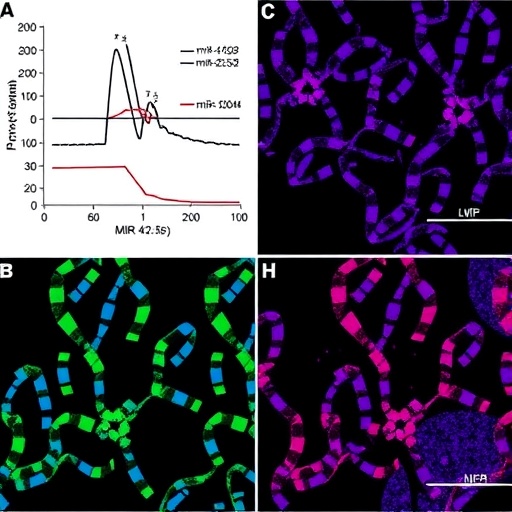In the world of oncology, understanding the intricate mechanisms that drive cancer metabolism is crucial for developing effective therapies. Recent advances in proteomic profiling have shed light on the roles played by specific microRNAs in hepatocellular carcinoma (HCC), a predominant form of liver cancer. Among the myriad of molecules identified, miR-423-5p has emerged as a significant player, demonstrating the potential to modulate oncogenic metabolism within HCC.
Hepatocellular carcinoma presents a formidable challenge due to its complex biological behavior and its often-late diagnosis, which is usually linked to underlying liver diseases or cirrhosis. The overlapping pathways of dysregulated metabolism and tumor progression make it imperative to explore the molecular regulators associated with these processes. The research team led by Luce, Bocchetti, and Cossu adopted a cutting-edge proteomic approach to navigate this challenging landscape.
The studies have shown that miR-423-5p regulates a network of metabolic pathways that are critical for the survival and proliferation of cancer cells. By influencing key metabolic enzymes and signaling pathways, this microRNA highlights the plasticity of cancer metabolism, which allows tumor cells to adapt and thrive even in hostile environments. The expression patterns of miR-423-5p could therefore serve as a biomarker for HCC, aiding in not only the diagnosis but also in monitoring the progression of the disease.
One of the most intriguing aspects of miR-423-5p is its ability to impact glucose and lipid metabolism, two essential processes that are often hijacked by cancer cells for their growth advantages. The findings suggest that targeting miR-423-5p may disrupt these metabolic adaptations, offering a window for therapeutic intervention. As cancer cells exhibit increased reliance on glycolysis and fatty acid synthesis, a deeper understanding of this microRNA could pave the way for novel treatments aimed at metabolic vulnerabilities.
The research emphasizes the synergistic relationship between oncogenic signaling pathways and metabolic shifts within tumor cells. The proteomic data indicate that the action of miR-423-5p is not isolated; rather, it interacts with other regulatory networks, suggesting that a multi-target approach might be necessary for effective cancer treatment. Consequently, the integration of proteomic profiling with genomic data may enhance our understanding of HCC and improve therapeutic strategies.
Furthermore, the technology employed in the study marks a significant advancement in cancer research methodologies. Proteomic profiling allows researchers to assess the entire protein landscape within cancer cells, providing insights that are often missed by traditional genomic analyses. This comprehensive approach underscores the necessity of utilizing diverse scientific techniques to uncover the complexities of malignancies like HCC.
As the researchers continue to uncover the full array of functions performed by miR-423-5p, the implications for clinical applications become more pronounced. For instance, the potential for miR-423-5p as a therapeutic target could lead to the design of RNA-based drugs or antimicroRNA strategies, which could specifically inhibit the actions of this microRNA, leading to reduced tumor growth and increased sensitivity to existing therapies.
On a broader scale, the pathway outlined by the team could revolutionize how we view cancer metabolism. The interplay between microRNAs and their targeted metabolic pathways was once considered a niche topic; however, with the burgeoning evidence emerging from studies like the one conducted by Luce et al., it is now recognized as central to our understanding of tumor biology. The findings suggest that therapeutic strategies targeting metabolic pathways should intensively consider the role of such microRNAs.
Moreover, the discovery of additional roles played by miR-423-5p beyond the metabolic landscape could unveil new avenues for research. This microRNA may influence cell signaling, oxidative stress responses, or even interactions with the tumor microenvironment, broadening its relevance in the cancer biology discourse. As this field progresses, the understanding of miR-423-5p could lead to identifying additional biomarkers for early detection of HCC, allowing for timely interventions that could significantly alter patient outcomes.
While these findings are promising, the translational aspects still require extensive validation. Future studies will need to explore the therapeutic implications of manipulating miR-423-5p levels in vivo, examining how changes in this microRNA impact tumor growth and response to established cancer treatments in animal models. A concerted effort in clinical trials will be essential to translate these preclinical insights into practical applications for patients suffering from HCC.
The impact of molecular insights derived from studies like those of Luce and colleagues transcends beyond academic curiosity; they embody the very essence of precision medicine. Personalized treatment plans that consider individual patient’s molecular profiles hold the potential to transform cancer care dramatically. The journey from bench to bedside remains fraught with challenges, yet the path illuminated by miR-423-5p offers hope for innovative solutions in the fight against liver cancer.
In conclusion, the identification of miR-423-5p as a modulator of oncogenic metabolism in hepatocellular carcinoma marks a significant milestone in cancer research. It not only enhances our understanding of hepatic tumor biology but also lays the groundwork for future therapeutic strategies. As researchers continue to unravel the complexities of cancer metabolism, it is crucial to maintain a focus on integrating proteomic and genomic approaches, ultimately paving the way for more effective interventions against HCC. The fight against liver cancer is far from over, but studies such as this one are critical in anchoring our fight with robust scientific insight and fervor.
Subject of Research: The role of miR-423-5p in modulating oncogenic metabolism in hepatocellular carcinoma.
Article Title: Proteomic profiling identifies miR-423-5p as a modulator of oncogenic metabolism in HCC.
Article References:
Luce, A., Bocchetti, M., Cossu, A.M. et al. Proteomic profiling identifies miR-423-5p as a modulator of oncogenic metabolism in HCC. J Transl Med 23, 1008 (2025). https://doi.org/10.1186/s12967-025-07039-4
Image Credits: AI Generated
DOI:
Keywords: HCC, miR-423-5p, proteomic profiling, oncogenic metabolism, cancer research.
Tags: biomarkers for liver cancercancer metabolism regulationdysregulated metabolism in liver diseasesliver cancer survival mechanismsmetabolic pathways in HCCmicroRNAs in cancer therapymiR-423-5p in hepatocellular carcinomamolecular regulators of canceroncogenic metabolism modulationproteomic profiling in oncologytargeted therapies for hepatocellular carcinomatumor progression and metabolism





